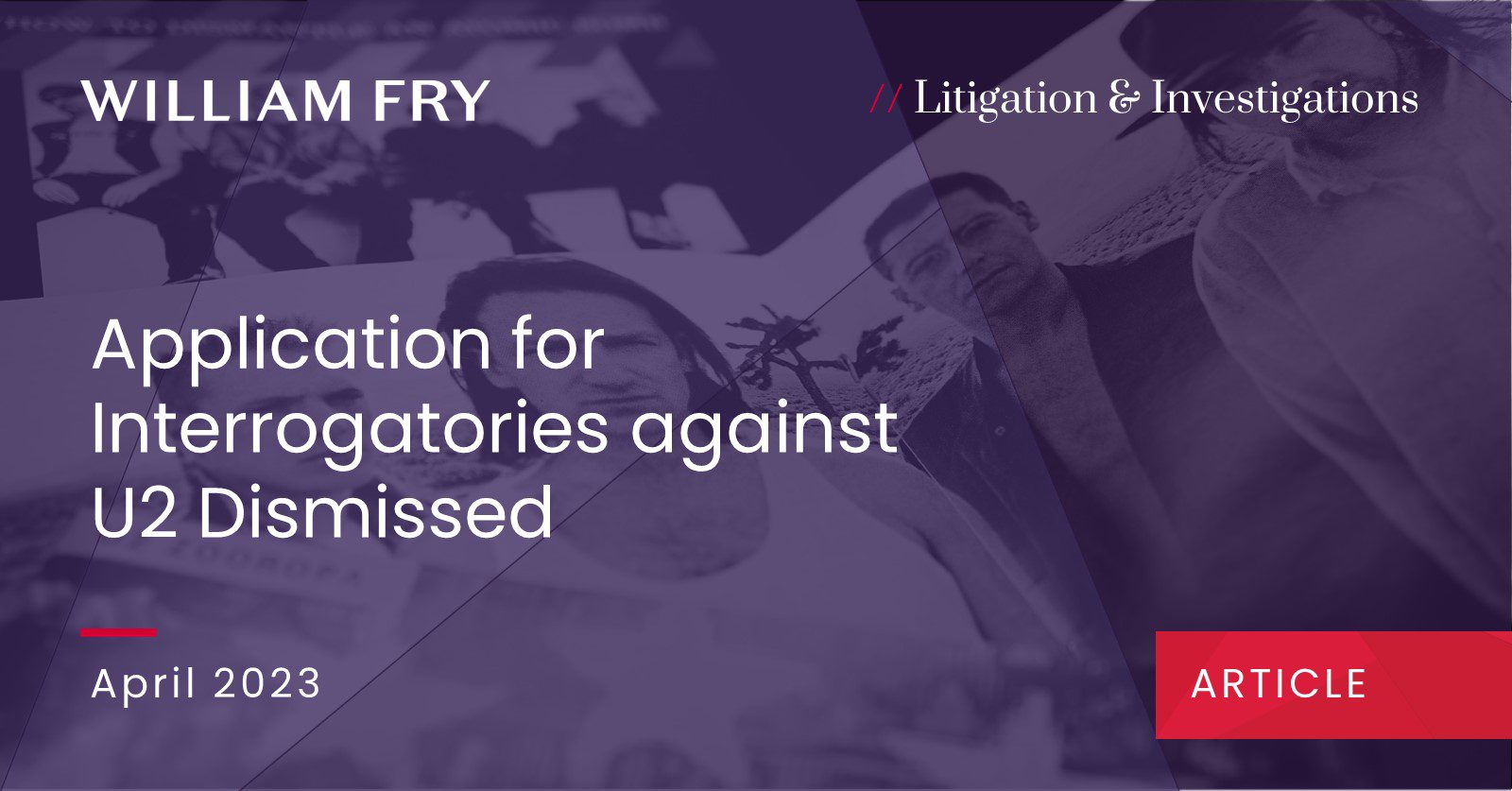In Kiely v U2 Limited [2023] IEHC 153, Mr Justice O’Moore dismissed an application for interrogatories raised against Adam Clayton, the bass guitarist in U2, by a Dublin musician, Maurice D Kiely. Mr Kiely raised 16 interrogatories to be answered by Mr Clayton. However, the application was dismissed as the interrogatories were found to be inappropriate.
Background
Mr Kiely claimed that he wrote the song “A Man and a Woman” (Song) which appears on the U2 album “How to Dismantle an Atomic Bomb”. He alleged that he offered the song to U2 for use on the album under the condition that the Song would not be performed live by U2 and that the band would not register the Song as their own composition with any “copyright office”.
Mr Kiely claimed that Mr Clayton agreed to this arrangement, but it was not honoured by U2. The Song was performed live by U2 at a 2011 charity concert for the Bill Clinton Foundation, and Mr Kiely alleged that the band had claimed copyright in the Song, breaching the agreement. Mr Kiely instituted proceedings before the High Court (Court) for breach of intellectual property rights, and sought damages of €8 million, and punitive damages of €4 million against U2. A full defence was filed by U2.
Grounds for dismissal
U2 argued that leave was not sought to deliver interrogatories, as required under Order 31 Rule 1 of the Rules of the Superior Courts (RSC). The fact that leave to deliver the interrogatories was not obtained, was of itself, sufficient to allow the Court to find that the application was either premature or an abuse of process. However, O’Moore J considered each interrogatory raised individually, as this approach was the most “expeditious use of court time and of the parties’ resources”.
The Court found that the application must fail for failure to obtain leave and the inappropriateness of the interrogatories.
Leave Requirement
Order 31 Rule 1 RSC specifies that in matters where relief is sought through damages or on the ground of fraud or breach of trust, the plaintiff may at any time after delivering his statement of claim, and a defendant may at or after the time of delivering his defence, deliver interrogatories without leave of the court. In every other cause or matter, leave of the court is required to deliver interrogatories. Mr Kiely argued that the agreement established a trust, and for that reason, he did not require leave from the court to deliver the interrogatories. However, O’Moore J did not accept this argument.
Appropriateness of Interrogatories
The interrogatories were deemed inappropriate as they concerned matters of evidence or were irrelevant. O’Moore J stated that “certain of these interrogatories have nothing whatsoever to do with the case described in the pleadings”. For example, the interrogatories questioned whether Mr Clayton had ever come to the attention of the Gardaí in relation to the importation of narcotics into Ireland and whether he had ever spent time in prison for drugs-related offences or other criminal offences. Mr Kiely also asked; “Have you, Adam Clayton, ever discussed [the Song] with the supermodel Cindy Crawford with reference to myself the plaintiff?”
Another interrogatory asked Mr Clayton to identify a certain witness. However, Mr Kiely had already identified this person by name in his replies to particulars. Therefore, the interrogatory was inappropriate and unnecessary.
Conclusion
O’Moore J noted that Mr Kiely’s claim would, on the face of it, qualify for admission to the Commercial Court. The significance of this point is that interrogatories can be delivered in cases in the Commercial List, without leave of the court. O’Moore J described this “vagary” in the court rules as illogical, suggesting that it might be varied in due course.
Interrogatories can be a useful and cost-effective tool in litigation and can be a more time-efficient means of eliciting information than discovery. However, this judgment reminds litigants of the importance of complying with procedural court rules on interrogatories and the courts’ vigilance against using interrogatories in an inappropriate or vexatious manner.
For further discussion on interrogatories, see our previous articles, which are accessible here, here, here and here.
If you have any queries concerning interrogatories and their proper and efficient deployment, please get in touch with Adele Hall, Paul Convery or your regular William Fry contact.
Contributed by Jane Gallagher




